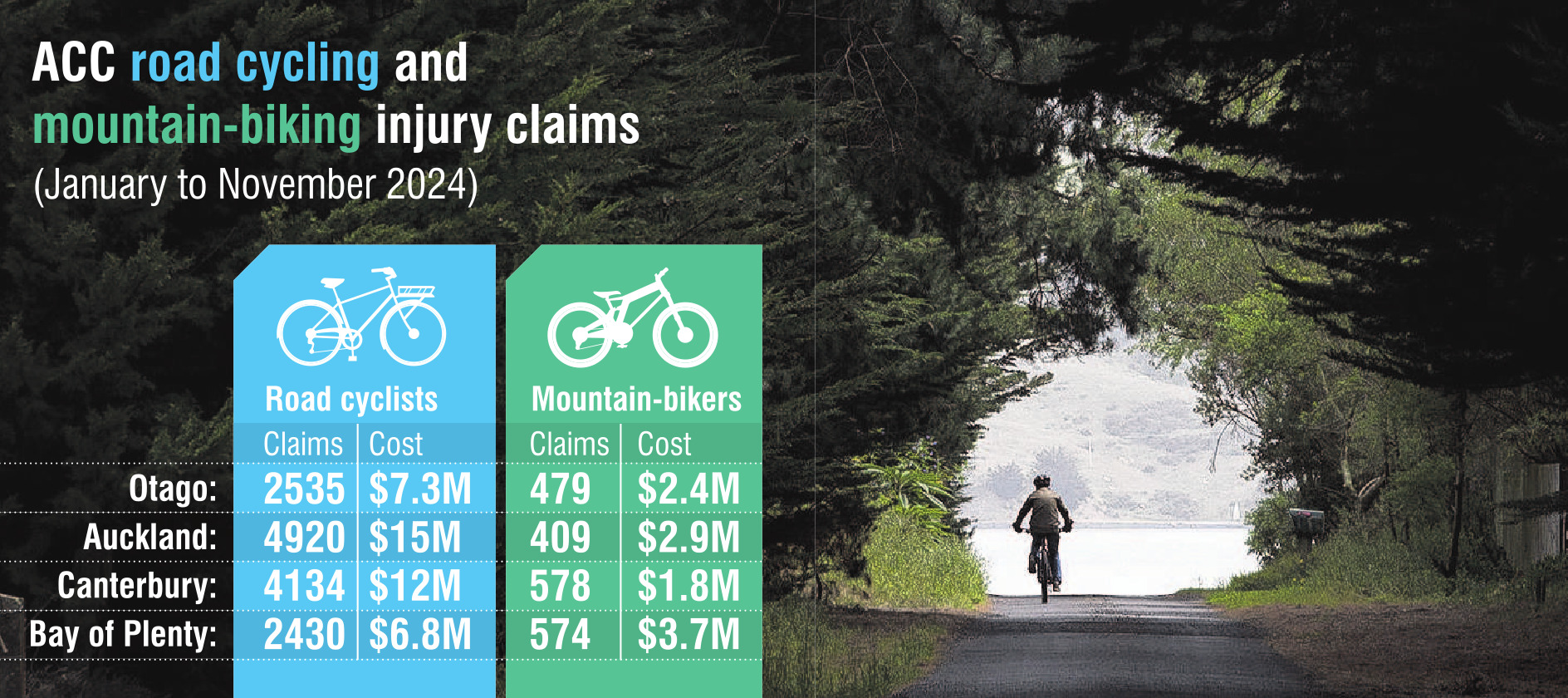
Cyclists and mountainbikers are being urged to show more caution this summer after ACC statistics for 2024 to date show there have been 24,104 road cycling-related injury claims, costing $71 million to help riders recover; and 3443 mountainbiking-related injury claims, costing more than $18m.
At the top of the list of regions where the most ACC claims have been accepted are Auckland, Canterbury, Otago and the Bay of Plenty.
Otago road cyclists received 2535 injuries while out riding, costing the ACC $7.3m to help them recover, and 479 mountainbikers claimed for injuries costing $2.4m.
Auckland road cyclists lodged 4920 injury claims, costing $15m, and mountainbikers had 409 claims costing $2.9m.
The Canterbury region had a high number of road cycling-related injuries with 4134 claims, which cost $12m, and 578 mountainbiking claims costing almost $1.8m.
The Bay of Plenty had 2430 road cycling claims, costing $6.8m, while mountainbikers racked up 574 claims, totalling $3.7m.
ACC injury prevention leader James Whitaker said this year, males were almost twice as likely to experience a road cycling injury, compared with females, and the over-50s made a notable appearance in the statistics.
He said the most frustrating thing was many of these injuries could have been prevented.
"The leading cause of road cycling-related injuries was loss of balance and personal control, so look ahead for cars, potholes, slippery surfaces, or anything that might stop your wheels from turning.
"These types of injuries aren’t random or unpredictable, and we can play a part in stopping them," Mr Whitaker said.
Mountainbiking was one of New Zealand’s favourite summertime activities, but riding full speed down a mountain came with "risks".
Whether it be road cycling or mountainbiking, there were plenty of things riders could do to reduce the risk of hurting themselves or others, he said.
The first thing riders should do before getting back on their bikes was to check their bike was "ride ready".
He recommended the "ABCD check", which was a quick and easy safety check that could make all the difference in preventing injuries.
"A stands for air — check the air in your tyres.
"B stands for brakes — check both your front and back brakes are working.
"C is for chain — make sure your chain is going around the clogs on your bike properly and you’ve got a little bit of lube.
"And D is for drop — pick up your bike and drop it on the ground. If there’s anything loose, you’re going to feel or hear it rattle," he said.
He also suggested riders choose trails or roads that matched their skills and experience; ease into the ride; and stop in places where you won’t get in other people’s way.
"Also check that you’ve got the right safety gear and that it fits you properly.
"Make sure your helmet meets New Zealand safety standards."
Mr Whitaker said if it had been a while since your last ride, or you had a new bike, it would be wise to do a few test rides in a quiet, traffic-free spot first.
"We encourage people to be out on their bikes over summer, but taking a pause for just a few seconds can help prevent injury and harm to yourself and others.
"No-one wants to begin their summer with a trip to the emergency room," he said.












